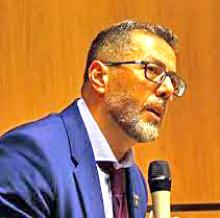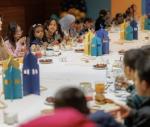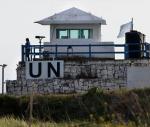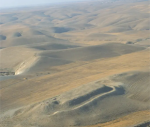You are here
How Intifada changed the political discourse around Palestine
Dec 15,2020 - Last updated at Dec 15,2020
December 8 came and went as if it was an ordinary day. For Palestinian political groups it was another anniversary to be commemorated, however hastily. It was on this day, thirty-three years ago, that the First Palestinian Intifada (uprising) broke out, and there was nothing ordinary about this historic event.
Today, the uprising is merely viewed from a historic point of view, another opportunity to reflect and, perhaps, learn from a seemingly distant past. Whatever political context to the Intifada, it has evaporated over time.
The simple explanation of the Intifada goes as follows: Ordinary Palestinians at the time were fed up with the status quo and they wished to “shake off” Israel’s military occupation and make their voices heard.
Expectedly, the Palestine Liberation Organisation (PLO) quickly moved in to harvest the fruit of the people’s sacrifices and translate them into tangible political gains, as if the traditional Palestinian leadership truly and democratically represented the will of the Palestinian people. The outcome was a sheer disaster, as the Intifada was used to resurrect the careers of some Palestinian “leaders”, who claimed to be mandated by the Palestinians to speak on their behalf, resulting in the Madrid Talks in 1991, the Oslo Accords in 1993 and all other “compromises” ever since.
But there is more to the story.
Thousands of Palestinians, mostly youth, were killed by the Israeli army during the seven years of Intifada, where Israel treated non-violent protesters and rock-throwing children, who were demanding their freedom, as if enemy combatants. It was during these horrific years that such terms as “shoot to kill” and ‘broken-bones policies’ and many more military stratagems were introduced to an already violent discourse.
In truth, however, the Intifada was not a mandate for Yasser Arafat, Mahmoud Abbas or any other Palestinian official or faction to negotiate on behalf of the Palestinian people, and was certainly not a people’s call on their leadership to offer unreciprocated political compromises.
To understand the meaning of the Intifada and its current relevance, it has to be viewed as an active political event, constantly generating new meanings, as opposed to a historical event of little relevance to today’s realities.
Historically, the Palestinian people have struggled with the issue of political representation. As early as the mid-20th century, various Arab regimes have claimed to speak on behalf of the Palestinian people, thus, inevitably using Palestine as an item in their own domestic and foreign policy agendas.
The use and misuse of Palestine as an item in some imagined collective Arab agenda came to a relative end after the humiliating defeat of several Arab armies in the 1967 war, known in Arabic as the “Naksa”, or the “Letdown” . The crisis of legitimacy was meant to be quickly resolved when the largest Palestinian political party, Fatah, took over the leadership of the PLO. The latter was then recognised in 1974 during the Arab Summit in Rabat, as the “sole legitimate representative of the Palestinian people”.
The above statement alone was meant to be the formula that resolved the crisis of representation, therefore drowning out all other claims made by Arab governments. That strategy worked, but not for long. Despite Arafat’s and Fateh’s hegemony over the PLO, the latter did, in fact, enjoy a degree of legitimacy among Palestinians. At that time, Palestine was part and parcel of a global national liberation movement, and Arab governments, despite the deep wounds of war, were forced to accommodate the aspirations of the Arab people, keeping Palestine the focal issue among the Arab masses as well.
However, in the 1980s, things began changing rapidly. Israel’s invasion of Lebanon in 1982 resulted in the forced exile of tens of thousands of Palestinian fighters, along with the leaderships of all Palestinian groups, leading to successive and bloody massacres targeting Palestinian refugees in Lebanon.
The years that followed accentuated two grave realities. First, the Palestinian leadership shifted its focus from armed struggle to merely remaining relevant as a political actor. Now based in Tunis, Arafat, Abbas and others were issuing statements, sending all kinds of signals that they were ready to “compromise” — as per the American definitions of this term. Second, Arab governments also moved on, as the growing marginalisation of the Palestinian leadership was lessening the pressure of the Arab masses to act as a united front against Israeli military occupation and colonialism in Palestine.
It was at this precise moment in history that Palestinians rose and, indeed, it was a spontaneous movement that, at its beginning, involved none of the traditional Palestinian leadership, Arab regimes, or any of the familiar slogans. I was a teenager in a Gaza refugee camp when all of this took place, a true popular revolution being fashioned in a most organic and pure form. The use of a slingshot to counter Israeli military helicopters; the use of blankets to disable the chains of Israeli army tanks; the use of raw onions to assuage the pain of inhaling teargas; and, more importantly, the creation of language to respond to every violent strategy employed by the Israeli army, and to articulate the resistance of Palestinians on the ground in simple, yet profound slogans, written on the decaying walls of every Palestinian refugee camp, town or city.
While the Intifada did not attack the traditional leadership openly, it was clear that Palestinians were seeking alternative leadership. Grassroots local leadership swiftly sprang out from every neighbourhood, every university and even in prison, and no amount of Israeli violence was able to thwart the natural formation of this leadership.
It was unmistakably clear that the Palestinian people had chosen a different path, one that did not go through any Arab capital, and certainly not through Tunis. Not that Palestinians at the time quit seeking solidarity from their Arab brethren, or the world at large. Instead, they sought solidarity that does not subtract the Palestinian people from their own quest for freedom and justice.
Years of relentless Israeli violence, coupled with the lack of a political strategy by the Palestinian leadership, sheer exhaustion, growing factionalism and extreme poverty brought the Intifada to an end.
Since then, even the achievements of the Intifada were tarnished, where the Palestinian leadership has used it to revive itself politically and financially, reaching the point of arguing that the dismal Oslo Accords and the futile peace process were, themselves, direct “achievements” of the Intifada.
The true accomplishment of the Intifada is the fact that it almost entirely changed the nature of the political equation pertaining to Palestine, imposing the “Palestinian people”, not as a cliche used by the Palestinian leadership and Arab governments to secure for themselves a degree of political legitimacy, but as an actual political actor.
Thanks to the Intifada, the Palestinian people have demonstrated their own capacity at challenging Israel without having their own military, challenging the Palestinian leadership by organically generating their own leaders, confronting the Arabs and, in fact, the whole world, regarding their own moral and legal responsibilities towards Palestine and the Palestinian people.
Very few popular movements around the world, and throughout modern history, can be compared to the First Intifada, which remains as relevant today as it was when it began thirty-three years ago.
Ramzy Baroud is a journalist and the editor of The Palestine Chronicle. He is the author of five books. His latest is “These Chains Will Be Broken: Palestinian Stories of Struggle and Defiance in Israeli Prisons” (Clarity Press). Dr Baroud is a non-resident senior research fellow at the Centre for Islam and Global Affairs (CIGA) and also at the Afro-Middle East Centre (AMEC). His website is













